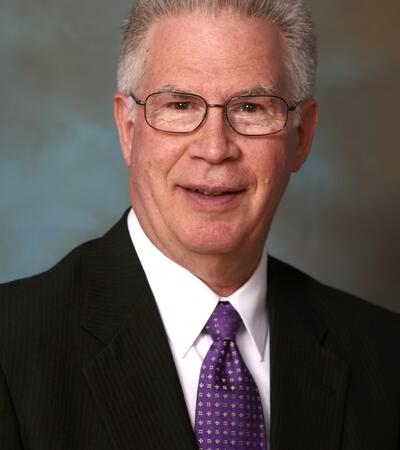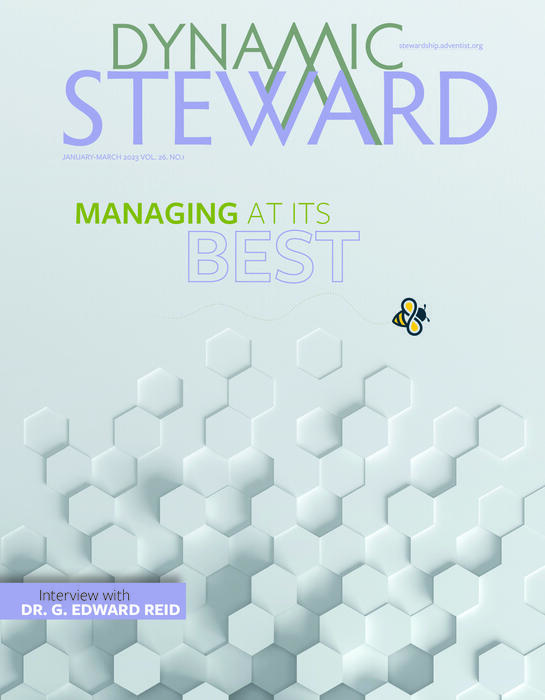Nurturing Stewards: An Interview with Dr. G. Edward Reid
We are glad to share an interview that we had with G. Edward Reid, JD. Dr. Reid is the main contributor of the Adult Sabbath School quarterly for the 1st quarter of 2023. He has a wealth of experience as a stewardship leader and educator.
Q: Dr. Reid what can you share with us about your pastoral ministry and the beginning of your ministry as a stewardship leader?
A: I started out as a pastor in the Gulf States Conference, where I worked for about 12 years. And from there, I was called by the Georgia-Cumberland Conference to be the health director of the conference. I was also helping in evangelism and stewardship. While in the Georgia-Cumberland Conference, I went to law school and became an attorney. Then I was appointed as the stewardship director for the Georgia-Cumberland Conference. One of my main tasks was to raise money for the new Cohutta Springs Adventist Conference Center.
I had the opportunity to participate in multiple weekend seminars with Larry Burkett, to learn about Christian financial concepts. Besides these technical principles of money management, I spent a lot of time studying the Bible and the Spirit of Prophecy to find out additional insights that have been very valuable for my books and seminars.
Q: How has your ministry evolved in the area of stewardship?
A: I started doing seminars all over the country, especially the Georgia-Cumberland Conference. But then, interestingly enough, I was called by the North American Division to be the Secretary-Treasurer of ASI (Adventist Laymen’s Services & Industries). I was there for three years in that position. Then the Review and Herald Publishing Association asked me to write a book on money management. I agreed and wrote It’s Your Money! Isn’t It? So, after that, I accepted the position of stewardship director for the North American Division. That was about 1994. In that position, I traveled to all 58 conferences in North America as a camp meeting and worker’s meeting speaker. I also conducted many weekend seminars at local churches and Adventist colleges. My last task for the NAD was writing and editing the material for Faith and Finance, which I think is still available today from the NAD Stewardship Department.
After my work in stewardship, I served for eight years with Adventist World Radio (AWR), working with the Planned Giving Department.
Q: How would you define Christian stewardship?
A: Well, we are children of God. And as children, as in any family, we have responsibilities and rewards. God has given us the responsibility of managing His affairs on this earth. As an example, it takes a lot of money to run the church here, but God doesn’t sign any checks. He blesses the people down here with money, and we get to support His work.
Q: Can you elaborate more on financial stewardship?
A: It’s a biblical concept. In the book of Proverbs, we are given much valuable information about money management. For example, Proverbs 22:7 says: “The rich rules over the poor, and the borrower is servant to the lender.”[*] There are probably 20 or more verses in the Bible that deal with debt. All of them are negative. It’s not sinful to have some debt. But it is a burden on people, and the Scriptures counsel us to avoid debt.
So this quarter’s lessons are not so much about theology, although the teaching is theologically correct, they’re about management and practical Christian living. It’s probably the most practical Sabbath School lesson you can study because it actually tells you how to be financially faithful.
Q: What more can you tell us about these lessons on “Managing for the Master”?
A: The goal is financial faithfulness. But you can’t be faithful if you don’t understand your financial situation. The lessons in this quarterly point out the practical steps to becoming financially literate, and spiritually. It’s not so much that our people are belligerent and unwilling, but many are simply ignorant of the principles that God has given us. This is not a matter of criticism, it’s just that I’ve observed this situation among members. So what I’m trying to do in these lessons is to practically train people to learn about God’s will for the management of their money.
We will have happier families if we manage well. In addition, the work of God will be well supported. No church will be without God’s blessings, and churches will be moving forward in evangelism. We all want to see the work finished and Jesus come back, but it’s going to take money, it’s going to take sacrifice. We want all to see God, and so that’s why I talked about the rewards of the faithful in the last lesson.
Q: How would you respond to those challenging the practice of tithing and offerings?
A: Well, the interesting thing is that tithing was God’s idea. Tithing was not mandated by a committee at the General Conference or the Stewardship Department. When you look at all the biblical texts about money management, they make a nice whole. They show us how to operate and how to have peace and God’s blessing in our lives. It’s amazing. I tell people that tithing is not a responsibility so much as it is a privilege because God allows us to be involved in His work in a way that can bring peace to our lives, prosperity to our families, stability to our marriages, and so on. It is completely different when you’re involved with God’s work in a totally committed way.
One of the things that is very interesting to understand is from Jesus’ sermon on the mount. In Matthew 6, there are about 14 verses that deal with money management. One of them says, “Do not store up for yourselves treasures on earth.” That’s Matthew 6:19. But, Jesus continued in verse 20, “But store up for yourselves treasures in heaven.” The whole idea is that from a human perspective, we want to take care of our family and take care of ourselves. In God’s perspective, we take care of God’s work, and He’ll take care of us.
Q: Why did you choose to write one complete lesson on covetousness?
A: We rarely hear a sermon or read an article about covetousness. But it is the last one of the Ten Commandments (Ex. 20:17). As you know, according to the New Testament, those who are covetous will not inherit the kingdom of God (1 Corinthians 6:9, 10). Covetousness is defined as an inordinate desire for the position or the possessions of another. And how do you overcome it? That’s what the whole lesson is about, how do you live above the earthly desires for more?
There are several Bible stories that talk about covetousness. The devil himself was coveting God’s position. Adam and Eve wanted to be like God. People sometimes think that if they could just get a little bit more money or a little bit more of this or that, they’d be happy. But covetousness is something we should guard against. The best way to guard against covetousness is to put God first, to be very generous with others and the cause of God.
Q: How do you resonate with the God First theme chosen by the Stewardship Ministries Department?
A: Always put God first in everything you do. The Spirit of Prophecy talks about not just being faithful with tithe but putting God first with the tithe. In other words, don’t wait till the last thing to return your tithe, even if it’s an honest tithe, but to do that first thing to get God’s blessing. When people talk about their needs, I just tell them, if you put God first, He’ll take care of you. Matthew 6:33 tells us to “seek first the kingdom of God and His righteousness, and all these things shall be added to you.” My favorite text for stewardship is Proverbs 3:9,10: “Honor the Lord with your possessions, and the firstfruits of all your increase.” If you do that, then “your barns will be filled with plenty, and your vats will overflow with new wine.”
Q: Members seem to have a better understanding of tithing than offerings, and this is evident in their giving practices. What would you suggest to revitalize mission offerings?
A: One reason is there’s not as much emphasis in local Sabbath Schools about missions as there used to be. If people are not aware of what’s going on, if they do not understand the sacrifice endured by many people who are involved in mission work, they are not inclined to be supportive. Another factor is that many church members don’t realize where all the offerings go. They think offerings are just like a big hole in the church, and it never gets filled up. No matter how much the church gets, there’s always more need! Regular, accessible, and clear information is essential.
Our local church helps sponsor a missionary and a tremendous range of missions projects. And we’re very happy that we can do that in addition to our regular tithes and offerings.
Q: You are hinting at the idea of giving offerings as a proportion of income, can you expand?
A: Many years ago, we contributed to the development of the personal giving plan in the North American Division. I believe that we should all be systematic in our offering, and then more as God blesses us. I always tell people that we rarely have the problem of giving too much. And I think if we give more than we need to, God will get it back to us in some way. He’s honest. If we believe that the work is being finished, we should want to be a part of it. I believe that people that have a good income should be giving more in offerings than their tithe.
There has been a kind of conundrum over the years about systematic giving, as opposed to project giving. My personal feeling is that we should do both. Believers should systematically do what they can; my wife and I have done at least 5% over the years. There are also special projects that are valuable that people need to know about, and people like to be challenged. I think that it’s appropriate to be systematic in your offerings, so that the treasurers in our local churches and local conferences can count on us for a certain amount. It’s kind of like the temple tax in that way. But beyond that, there ought to be projects that people know about, because if there are not any projects, people won’t think anything’s happening.
Q: What results would you hope to see after the world church has studied a full quarter on stewardship?
A: I would like to see that members are out of debt, getting along well with their families, and generous with the church. Another thing is for our people to grow in their financial literacy level.
Academic Achievements
- Bachelor of Arts in theology from Southern Adventist University
- Master's degree in Divinity from Andrews University
- Master's degree in Public Health from Loma Linda University
- Juris Doctor from Georgia State University School of Law
Books Written by Ed Reid:
- It’s Your Money, Isn’t It?
- Even at the Door
- Sunday’s Coming
- Almost Home
- Ready Or Not
- Battle of the Spirits
- Managing for the Master (Principal Contributor)
- Faith and Finance (Ed.)
[*] All Scripture quotations are from the New King James Version®. Copyright © 1982 by Thomas Nelson. Used by permission. All rights reserved.


